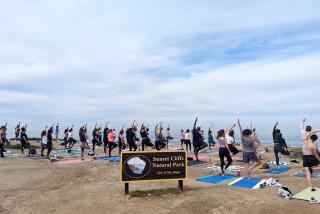RELIGION : Buddhists Lose Bid to Enlarge Temple : Azusa council upholds ruling that said the proposed facility would have created congestion. Group says its freedom of religion is being violated.
The city of Azusa has refused a local Buddhist organization’s request to construct a larger temple on its property, leading the group to charge that its freedom of religion is being denied.
The Progressive Buddhist Assn. requested permission to construct a 9,200-square-foot building on two acres of land it owns in the Azusa foothills. The planning commission denied the proposal, saying the new facility would result in traffic congestion and draw too many visitors to the quiet, rustic neighborhood. The City Council upheld the decision in February.
“The feeling was that the intensity of the use was inconsistent with the rural surroundings,” said planner Daniel Watrous, who reviewed the plan.
The Buddhist group says the temple would be used primarily for meditation and lectures, and would host larger ceremonies only once a month. Leaders say the current single-family home on the site is inadequate for that purpose.
Rancor over the temple’s activities began in 1989, when neighbor Peter W. Bromley protested to the council that children were allowed to play noisily in the yard, unsupervised, while evening meetings were in progress. And during a weekend ceremony consecrating a temple for the monks, he said there was loud chanting and gatherings of 50 or more people on the site.
As a result, the council passed a resolution that limited the center to 50 adult visitors at a time, established a curfew of 10 p.m. for religious services, required children to be supervised at all times and restricted them from playing near Bromley’s property.
“One of the complaints made was very funny; that children teased his horse,” said Tin Htoon, president of the association. “We told (the city) that such simple matters as the children teasing his horses should be left to the neighbors to resolve, rather than the city getting entangled in this.”
Htoon said that the consecration of the monks’ temple was a one-time event, similar to the consecration of a church, and that most of the center’s activities are virtually silent. He said that nearby condominium complexes have created far denser development, and greater traffic flow, than would the proposed new temple.
“We brought up at the hearing that we have lost our freedom to practice our religion freely and to have the rights of a property owner also,” Htoon said.
Watrous said, however, that the condominium complexes are in a different zone than the center and that the decision to deny the permit was in no way related to the association’s religious practices.
Htoon said the association is awaiting formal notice of the council’s denial before deciding what action to take next.
More to Read
Sign up for Essential California
The most important California stories and recommendations in your inbox every morning.
You may occasionally receive promotional content from the Los Angeles Times.









